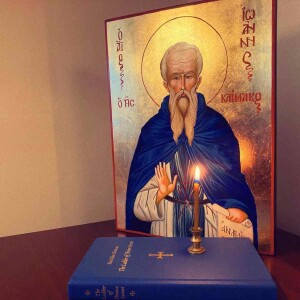Tonight we continued our reading of Step 4 on Obedience and its practice in the spiritual life. Saint John, as well as so many of the desert fathers, unearth what we typically keep hidden within our hearts. Rather than living in a spirit of obedience and allowing that obedience to bear the fruit of humility within us by setting aside our own willfulness, we cling to the illusions of self-sufficiency. Despite all that Christ has done and despite all that God has given to us, we believe that we can live with one foot in the world and one foot in the kingdom. The humility that obedience fosters teaches us that we cannot externalize or distance ourselves from the evil and the sin of the world. There is a radical solidarity between ourselves and others that demands a constant movement of our heart - repentance. Whenever we see evil or sin, our first movement must be toward God in a cry for mercy and healing. We must humbly lay bare our wound to the physician and without being ashamed say: “It is my wound, father, it is my plague, caused by my own negligence, and, not by anything else. No one is to blame for this, no man, no spirit, no body, nothing but my own carelessness.“ We must allow these words to penetrate our hearts to root out all the excuses we put forward in order to remain in a place of mediocrity.
---
Text of chat during the group:
00:17:16 Anthony: Congratulations Fr David!
00:17:24 CMoran: Question: What is Prelest? I off-topic--If not appropriate, please ignore the question.
00:17:53 CMoran: Sorry..."IF"
00:17:58 Sr Mary of our Divine Savior solt: I missed what you said Father Where are you assigned?
00:18:02 Mark Kelly: Prelest is like a spiritual illusion of ones self.
00:18:18 Edward Kleinguetl: SS Peter & Paul in Duquesne, PA
00:18:20 Eric Ewanco: Prelast is Spiritual deception, I'm sure Father can elaorate
00:21:14 Mark Kelly: Prelest, in the extreme, is seeing one’s self as a prophet or spiritual guide or some exulted person. In common terms it is something we all must deal with. Spiritually deceiving ourselves.
00:53:01 Edward Kleinguetl: A priest once told me in confession that "no reformer ever had bitterness in his heart."
00:53:33 Edward Kleinguetl: And I have to remind myself of that frequently.
00:55:35 Marco da Vinha: What you say, Father, reminds me both of St. Nektarios - who carried out penance for his seminarians faults - as well as St. Bartholomew of Braga - who, as an archbishop, would, on occasion, do penance for his priests' sins.
00:57:14 Ambrose Little, OP: There’s also the observation you (Father) have mentioned many times, which is the challenge of clinging to one's own judgment being perhaps one of the most difficult failures in humility to overcome. It’s always worth meditating on the likely possibility that our own judgment may be in error or, at the very least, that our interpretation of another's words and actions may be in error. (Not talking about glaring and established moral failures like the abuse scandals, but the more common criticisms that this or that pastor is not saying what we’d have them say.)
00:58:37 Anthony: Being one who thinks a LOT - thinking and ruminating too much is not healthy. Prayer is where the goodness and healing is (at the very least, it's an emotional outlet to get rid of the thoughts), but the devil's fog machine blinds us to its availability. My parish priest said something in a homily like: we often make our own crosses and they are too heavy; the cross God makes for us is better and easier for us.
01:02:03 Marco da Vinha: @Anthony, I think Dostoevsky put it best in Notes from the Underground when the narrator says "To think too much is a disease." I have found that to be very much the case in my own life
01:09:32 Lee Graham: We are all guilty
01:09:38 Marco da Vinha: Father, is the kind of Confession that the Fathers mention different than the sacrament of Penance as we understand it now in the West? Was this Confession that took place within the elder/disciple relationship? The Fathers tell us to reveal our inner thoughts, our inner wounds in Confession, yet we are brought up in the West with the "just state kind and number" approach to Confession. Many times we don't give the priest much context, and we receive no advice either about our vices, even when the same priest here's our confessions on a regular basis.
01:10:09 Babington (or Babi): It and your comments are very helpful. Thank you.
01:16:00 Bridget McGinley: Father can the evil one enter the confessional and disturb either the priest or the penitent during the confession?
01:19:34 CMoran: Thank you Father! And thank you everyone!
01:19:43 Marco da Vinha: Thank you Father! Goodnight!
01:20:37 Deiren Masterson: Thank you Father! Such a grace!

No comments yet. Be the first to say something!